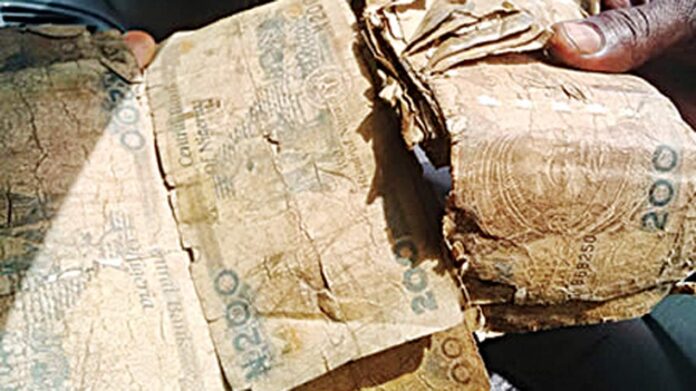Banks to pay fine to CBN for bringing in mutilated notes
By Jeph Ajobaju, Chief Copy Editor
Banks are to pay 400 per cent fine on the value of mutilated banknotes they deposit with the Central Bank of Nigeria (CBN), in a renewed push by the by the regulator to rein in the circulation of dirty naira notes that reflect badly on national image.
The CBN warned banks to stop including composed currency notes in their deposits or they will pay a penalty of 400 per cent of the value of such notes.
Composed banknotes are mutilated currency notes that comprise parts of different banknotes of the same denomination. The parts are usually put together with the intention of receiving value.
The CBN gave the warning in a circular, titled “Treatment of Composed Banknotes”, issued to all deposit money banks (DMBs), signed by Currency Operations Department Director Ahmed Umar.
“The management of the CBN observed with concern the increasing number of composed banknotes deposited by DMBs and request for replacement of such banknotes by members of the public,” Umar said.
“The existence of composed banknotes in the economy falsifies the true value of the currency in circulation, and can also be an avenue for fraudulent activities.
“Consequently, any composed banknote discovered in the deposit of DMBs shall attract a penalty of 400 per cent of the value.
“This circular takes effect from 1st April 2022.’’
_______________________________________________________________
Related articles:
Printing 2.5b new banknotes costs N58.6b in one year
The pros and the cons of CBN’s e-Naira
CBN discovers N56.83m counterfeit currency notes
Banknotes worth N698,593.29m destroyed by CBN
Blame banks for dirty naira notes in circulation – CBN
__________________________________________________________________
CBN’s definition of mutilated notes
The CBN introduced the Clean Note Policy in April 2019 to end the era of mutilated naira notes, according to reporting by The PUNCH.
A circular on the policy defined mutilated notes as poor quality banknotes that require a special examination to determine their value.
The note could be partially or permanently damaged by fire, water, dye, insects, rodents or destroyed by natural disasters, the circular added.
It directed banks and cash processing companies making deposits with the CBN to classify or sort their cash deposits into fit and unfit notes; failure to do so would attract a N12,000 penalty per box or an amount determined by the CBN.
The circular explained that the CBN and banks would continue to receive mutilated notes from the public.
But it is unclear if banks will continue to accept mutilated naira notes from customers because of the new directive from the CBN.













